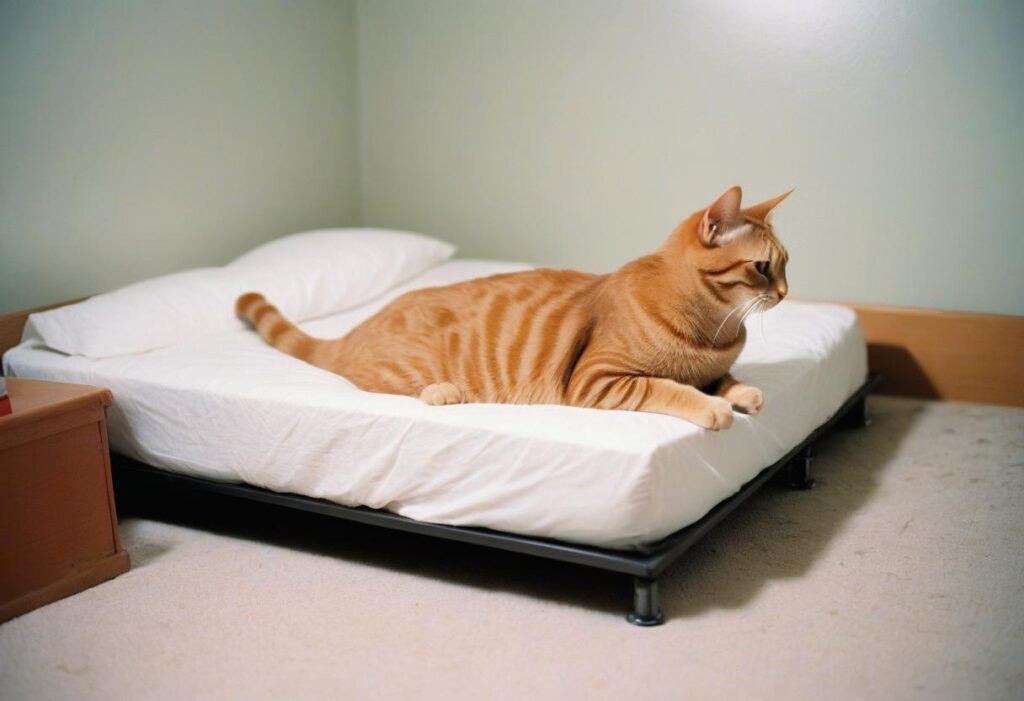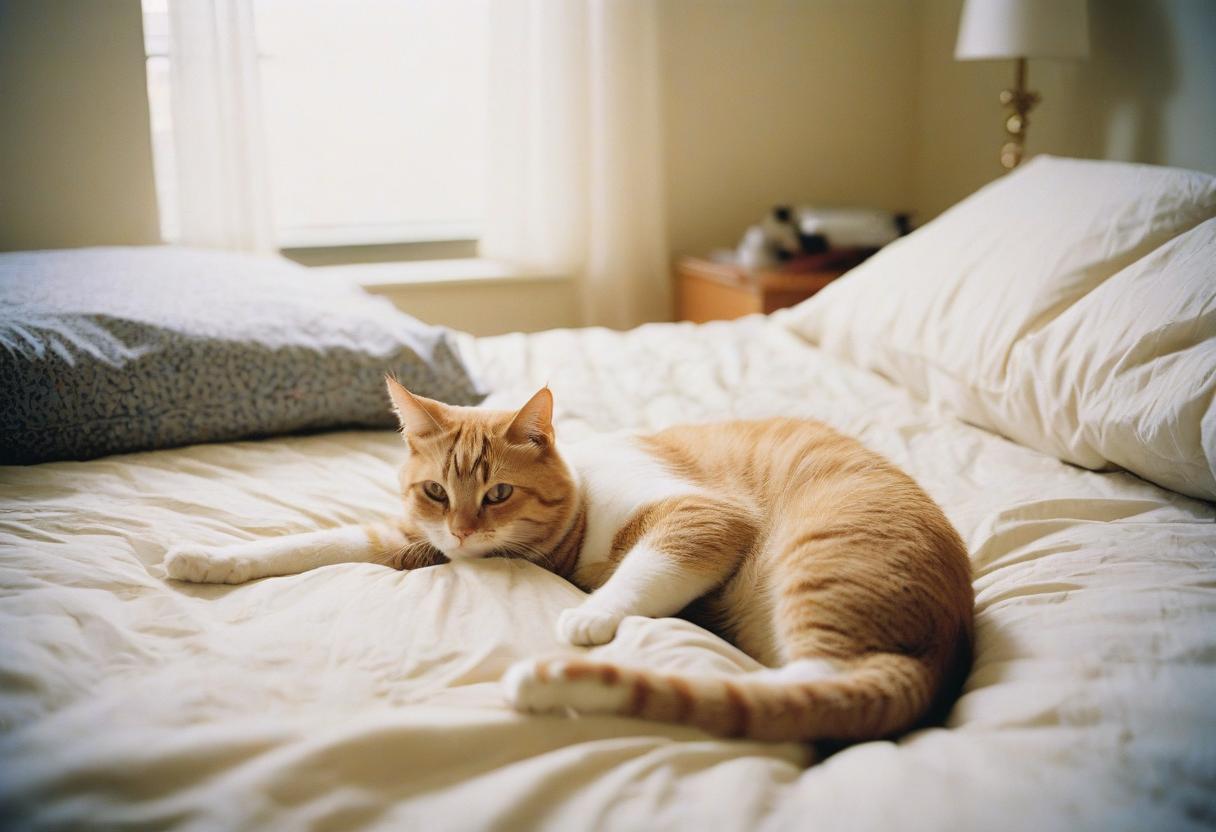Sharing your life with a cat brings plenty of joy and companionship—until your feline friend decides that your comfy bed is their new litter box. You’re not alone if you’ve been dealing with this frustrating behavior. Cats peeing on beds is a surprisingly common issue many cat owners face. But why do they do it, and more importantly, how can you stop it?
This guide will explore the potential reasons behind this behavior, from medical concerns to stress, and give practical tips to help you reclaim your bed (and sanity).
Why Do Cats Pee on Beds?

Understanding why your cat behaves this way is the first step to solving the problem. Here are some of the most common reasons cats choose your bed over their litter box.
Medical Issues
If your cat has started peeing outside its litter box, a medical problem could be the culprit. Cats with urinary tract infections (UTIs), bladder stones, or kidney issues often associate the litter box with discomfort and pain. Instead, they may opt for a softer, more comfortable place—like your bed.
What to Do:
Take your cat to the veterinarian immediately for a thorough check-up. Diagnosing and treating any underlying medical problems will often resolve the behavior.
Stress and Anxiety
Cats are creatures of habit, and changes to their environment or routine can cause stress. Stressful triggers might include:
- Moving to a new home.
- Introducing new pets or people into the household.
- Even subtle changes like rearranging furniture.
Your bed, which smells strongly of you, can offer your cat comfort and security during stressful times.
Signs of Stress in Cats:
- Hiding or avoiding interaction
- Over-grooming or excessive shedding
- Changes in appetite
What to Do:

Reduce stress by maintaining a consistent routine and creating a calm environment. Provide a quiet, safe space where your cat can retreat. Pheromone diffusers, like Feliway, can also help soothe an anxious cat.
Territorial Behavior
Cats use scent marking to claim their territory, and peeing can be a way to do this. This behavior might be triggered by other animals in the home or outside your window.
What to Do:
- Keep other pets away from your cat’s safe zones.
- Cover windows temporarily if outdoor animals are causing stress.
- Ensure your cat is spayed or neutered, as this reduces territorial marking behaviors.
Problems with the Litter Box
Sometimes, the litter box itself is the issue. Cats are very particular about where they do their business, and a litter box that doesn’t meet their standards could push them to seek alternatives, like your bed.
Standard Litter Box Issues:
- The box needs to be cleaner.
- It needs to be bigger or easier to access.
- It’s located in a noisy or high-traffic area.
- The type of litter is unpleasant to your cat.
What to Do:

- Clean the litter box daily and ensure there’s enough litter for digging.
- Try different types of litter to find one your cat prefers.
- Place the litter box in a quiet, easily accessible spot.
Behavioral Issues
Sometimes, inappropriate urination stems from behavioral factors rather than medical or environmental causes. Cats may pee on beds as an act of frustration or to get your attention. This could happen if they feel neglected or if they’re bored.
What to Do:
Spend quality time with your cat every day. Interactive play sessions, toys, and puzzle feeders can help keep them entertained and reduce undesirable behaviors.
Practical Tips to Stop Bed Peeing

Once you’ve identified the reason behind your cat’s behavior, here are additional steps to prevent future incidents.
Make Your Bed Less Appealing
- Cover your bed with a water-resistant mattress protector and a plastic sheet while you work on resolving the issue.
- Use aluminum foil or double-sided tape temporarily—cats dislike the texture and sound.
- Keep your bedroom door closed to limit access to your bed.
Improve Litter Box Habits
- Make sure you have enough litter boxes. The general rule of thumb is one per cat plus one extra.
- Position litter boxes in multiple spots around your home, especially if you have more than one cat.
- Regularly clean and occasionally replace old litter boxes, as odors can linger if the box is scratched or worn.
Use Positive Reinforcement
Reward your cat when it uses the litter box. A simple “good job” and a small treat can encourage consistent use. Avoid punishment, as it may worsen anxiety or fear.
Address Underlying Stress Quickly
If your cat’s stress trigger is temporary, like a house guest or renovation work, focus on providing extra love and reassurance. When it’s an ongoing issue, like introducing a new pet, take gradual steps to foster a positive relationship between your cat and the new arrival.
Consult a Behaviorist
If your cat’s behavior doesn’t improve or you’re struggling to pinpoint the cause, seek help from a professional animal behaviorist. They can offer tailored solutions specific to your cat.
How to Clean Cat Pee Properly
Even after addressing the root cause, lingering smells on your bed could encourage your cat to repeat the behavior. Cleaning the area thoroughly is crucial.
What You’ll Need:
- Enzymatic cleaner specifically for pet urine
- Absorbent towels
- Baking soda
Cleaning Steps:
- Blot up as much urine as possible with a towel—don’t wipe, as this can spread the pee.
- Apply an enzymatic cleaner to break down the urine proteins. (Avoid ammonia-based cleaners, as the smell resembles urine to cats.)
- Sprinkle baking soda over the area to neutralize any odors.
- Launder your bedding using a pet-safe detergent if possible.
Final Thought
Dealing with your cat peeing on your bed can be frustrating, but it’s essential to approach the situation with patience and empathy. Remember, your cat isn’t acting out of spite—it may be trying to communicate discomfort, stress, or an unmet need.
By addressing the root cause and making small changes, you can restore harmony to your home. And who wants to avoid enjoying a peaceful, clean bed?
If you’ve tried everything and still need help, consulting your vet or a pet behavior specialist is your next best step. Your cat deserves to feel happy, healthy, and safe—and so do you.





